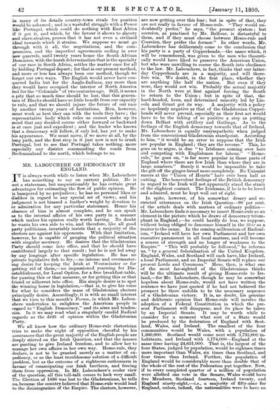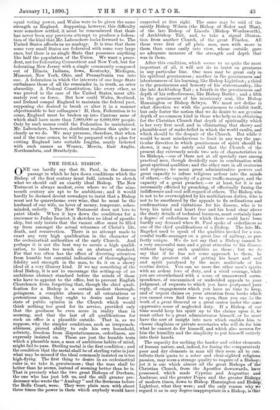MR. LABOUCHERE ON DEMOCRACY IN ENGLAND 1_ T is always
worth while to listen when Mr. Labouchere has something to say on current polities. He is not a statesman, but unquestionably he has certain great advantages for estimating the flow of public opinion. He is hampered by no_prejudices ; he has no personal likes or dislikes in regard to any special set of views ; and his judgment is not biassed a feather's weight by devotion to or admiration for any particular statesman. Hence his absence of bias is almost complete, and he can .speak as to the internal affairs of his own party in a manner which makes his opinion really worth having. No doubt he wants his own side to win, and therefore, like all good party politicians, invariably insists that a majority of the .electors are against his opponents. With that limitation, however, he is capable of gauging the political situation with singular accuracy. He desires that the Gladstonian Party should come into office, and that he should have contributed largely to that result ; but he is not led away shy any longings after specific legislation. He has no private legislative fish to fry,—no intense and overmaster- -nag desire for keeping the Irish at Westminster or for getting rid of them,—no impassioned yearning for Dia- -establishment, for Local Option, for a free breakfast-table, for passing this or that measure, or for getting this or that friend or adherent into office. His simple desire is to spot the winning horse in legislation,—that is, to give his voice for what he considers the mass of Gladstonian electors pnincipa.11y desire. Accordingly, it is with no small interest that we turn to this month's Foram, in which Mr. Labou- ehere undertakes to enlighten the American people in regard to " English Democracy," and its aims and tenden- cies. In it we may read what a singularly candid Radical regards as the drift of opinion within the Gladstonian Party.
We all know how the ordinary Home-rule rhetorician tries to make the night of opposition cheerful by his assurances that the great majority of the English people are deeply stirred on the Irish Question, and that the masses are panting to give Ireland freedom, and to allow her to manage her own affairs in her own way. Home-rule, they declare, is not to be granted merely as a matter of ex- pediency, or as the least troublesome solution of a difficult problem, but as the outcome of a righteous enthusiasm in favour of emancipating our Irish brethren, and freeing them from oppression. In Mr. Labouchere's cooler view of the question, all this tall-talk comes to look very small The Election of 1886 was lost to the Gladstonians, he tells aut,because the country believed that Home-rule would lead 'to the disintegration of the Empire. The electors, however, are now getting over this fear ; but in spite of that, they are not really in favour of Home-rule. " They would un- doubtedly prefer," he says, " the present system ; but coercion, as practised by Mr. Balfour, is distasteful to them, and if they must choose between Home-rule and Coercion, they prefer the former." In other words, Mr. Labouchere has deliberately come to the conclusion that his party is a party of Copperheads,—the"name which, it will be remembered, was given to the men who theoreti- cally would have liked to preserve the American Union, but who were unwilling to coerce the South into obedience to the law. Mr. Labouchere, in fact, thinks that our latter- day Copperheads are in majority, and will there- fore win. We doubt, in the first place, whether they are anything like half s the nation. But even if they were, they would not win. Probably the actual majority in the North were at first against forcing the South to return to the Union ; but in spite of that, the hard-headed, keen, and determined minority led by Lin- coln and Grant got its way. A majority with .a policy so hopelessly negative as that of the Gladstonian Copper- heads will never prevail, especially as their first act would have to be the taking of so positive a step as putting down Belfast with artillery and Gatlings. As to the feelings of the English democracy towards that of Ireland, Mr. Labouchere is equally unsympathetic when judged from the conventional Gladstonian standpoint. According to him, " it would be an error to suppose that the Irish are popular in England; they are the reverse." This, he goes on to argue, is due " to Irishmen coming over here and competing with Englishmen for labour." " Home- rule," he goes on, " is far more popular in those parts of England where there are few Irish than where they are in large numbers." Surely it would be impossible to take the gilt off the ginger-bread more completely. No Unionist sneers at the " Union of Hearts" have ever been half as cutting. The benevolent feelings of the British democracy in regard to the Irish will not-apparently stand the strain of the slightest contact. The Irishman, if he is to be loved and admired, must be kept well out of sight.
In spite, however, of his somewhat dreary and re- stricted utterances on the Irish Question .99per cent. of the article deals with matters of ordinary -polities— Mr. Labouchere finds it necessary to insert Home-ruless-an element in the picture which he draws of democracy trium- phant in England ;—he could hardly do less, we suppose, without being obliged to denounce himself in the Star as a traitor to the cause. In the coming millennium of " Ireland will have her own Parliament -and her own executive paramount in all local matters, and will become a source of strength and no longer of weakness to the Empire." " This will probably be followed," he informs us, " by a general federalisation of the United Kingdom. England, Wales, and Scotland will each have, like Ireland, a local Parliament, and an Imperial Senate will replace our present Lords and Commons." Here, then, is what one of the most far-sighted of the Gladstonians thinks will be the ultimate result of giving Home-rule to Ire- land,—for Mr. Labouchere, though he may be somewhat hopeless about Home-rule, would not have written the sentence we have just quoted if he had not believed 'the prospect he there unfolds to be the necessary sequence of a Gladstonian victory. It is, no doubt, his genuine and deliberate opinion that Home-rule will involve the adoption of a Federal Constitution in which the pre- sent Parliament will disappear, and its place be taken by an Imperial Senate. It may be worth while to consider for a moment what sort of a State would be produced by the federation of England with Scot- land, Wales, and Ireland. The smallest of the four communities would be Wales, with a population of 1,360,000. Scotland would come next with 3,735;000 in- habitants, and Ireland with 5,174,000—England at the same time having 24,631,000. That is, the largest of -the four States, judged by population, would be eighteen times more important than Wales, six times than Scotland, and four times than Ireland. Further, the population of England would be considerably more than double that of the whole of the rest of the Federation put together. Now, if to every completed quarter of a million of population were allotted one -vote in the Senate, Wales would have five Members, -Scotland fourteen, Ireland twenty, and England ninety-eight,--i.e., a majority of fifty-nine for England, unless, indeed, the nationalities were to have an equal voting power, and Wales were to be given the same strength as England. Supposing, however, this difficulty were somehow settled, it must be remembered that there has never been any previous attempt to produce a federa- tion of the kind that Mr. Labouchere looks forward to. The -United States affords us no analogy. It is true that there some very small States are federated with some very large ones, but there is no single State that possesses anything like half the population of the Union. We want a prece- dent, not for federating Connecticut and New York, but for federating New Jersey with a single community composed out of Illinois, Indiana, Iowa, Kentucky, Michigan, Missouri, New York, Ohio, and Pennsylvania run into one. A federation in which the interests of one huge State outbalance those of all the remainder is, in truth, an utter absurdity. A Federal Constitution, like every other, as was proved in the case of the United States, must ulti- mately rest on force. But how could Wales, Scotland, and Ireland compel England to maintain the federal pact, supposing she desired to break or alter it in a manner objectionable to her colleagues If, then, Federation is to come, England must be broken up into Cantons none of which shall have more than 7,000,000 or 8,000,000 people. Only by such means could the Federation be maintained. Mr. Labouchere, however, doubtless realises this quite as clearly as we do. We may presume, therefore, that when and if the time comes, he will be prepared with a plan for cutting England into suitable lengths, neatly ticketed with such names as Wessex, Mercia, East Anglia, Northumbria, and Strathclyde.







































 Previous page
Previous page